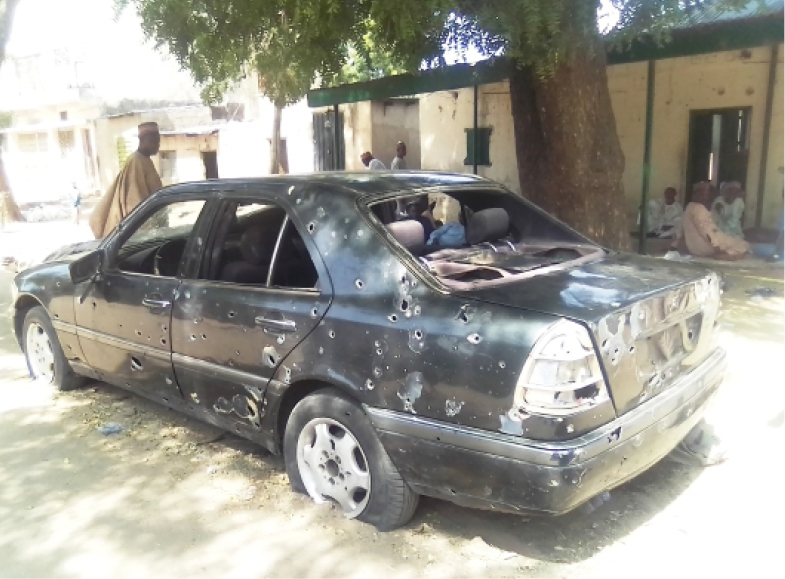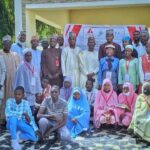Boko Haram’s first attack on Maiduguri in years has left many parents grieving as shells fired by the insurgents exploded near a gathering of children. Daily Trust reports on the tragic outcome of that sad Tuesday in the Borno State capital.
Tuesday, February 23, was a regular day in Maiduguri when Musa Sale and his four-year-old son, Abdullahi, went out for an errand.
Abdullahi is only four but had already told his parents he wanted to be a doctor. He was a good boy and sometimes helped to run errands in the house. That was exactly what he was doing that day when his life came to a sudden end.
- Buhari gives bandits 2 months to surrender – Zamfara governor
- Kaduna Deputy Governor’s look alike gains fame in community

“His mother gave him N20 to buy soya milk and we left the house together,” Musa Sale said. “I stopped near a mosque and he went on to buy the milk.”
What happened next would devastate the lives of the Sales and the entire residents of the beleaguered city. Musa dreads to recall it.
“Unexpectedly, I heard a bomb blast sound and I saw children who were playing on the street collapse one after the other, many of them covered in blood.”
One of these children was his son.
Boko Haram, which had been fighting a decade-long insurgency had driven a gun truck and seven motorbikes to Kaleri village on the outskirt of the capital and from there had fired rockets into the city. It was the first attack on the capital in years. They fired several shells before they were chased off by soldiers.
One of the shells fell on Layin Mahaukaciya, a street in the Gwange area, exploded and killed eight children and an elderly man.
Little Abdullahi was struck by shrapnel in the neck. He died on the scene. When the news reached his mother, she fainted and had to be revived.
For Musa, who only minutes before was holding his very-much-alive boy by the hand, before gathering his bloodied corpse in his arms, the grief can only be imagined. Abdullahi was confirmed dead at a local hospital.
“He was enrolled in the public primary school behind my house and was waiting for classes to start,” he said. “He was intelligent with an excellent memory and was talkative with adults. He said he wanted to be a medical officer and I wanted him to pursue a career in medicine later.”
It is a dream that now will never happen, no thanks to Boko Haram’s raid.
“In all, eight children and one adult were killed by the weapon while eight other children were hospitalized with life-threatening injuries,” Musa said.
While contending with his grief, he also acknowledges the grief of the other parents. One of them, Malam Abbas, lost two children during the attack with a third in a hospital receiving treatment.
One of the shells also breached a wall and killed an elderly man sitting in his room. The exploded shells also released smoke and powder that caused itchy eyes and skins. It also caused swellings and rashes on the skin of some children who also needed medical attention.
In all, 14 persons reportedly died during the attack while 40 others sustained injuries and were hospitalized.
Ali Hussaini, whose house was located a few meters from the blast scene, said his daughter, Sadiya, was among the children killed. She had gone to fetch water from a tap nearby when the attack happened.
“The weapon landed close to the children fetching water from a tap near a mosque and injured almost all of them. My daughter was injured in the abdomen by the fragments; an opening was created through which her intestines came out,” he said.
Sadiya was in primary three at a public school and hardly missed her lessons. She obeyed her parents and teachers and did what she was told, her father said.
Minutes after the incident, a state commissioner arrived at the area and helped convey the victims to a hospital in his vehicle.
Later, Governor Babagana Zulum attended the funeral prayer of the deceased who were assembled in one place.
The sum of N250,000 was given to each of the parents whose children were either injured or killed.
Bashir Bukari’s five-year-old son, Idris, was injured on the chest by the fragments and was admitted to a hospital.
“Pieces of the metal that injured the children after the weapon had exploded were actually poisonous and my son for instance had to undergo transfusion,” he said.
The tragedy, he said, cast a pall over the neighbourhood and many people simply could not eat that evening.
He said adequate safety measures must be taken by the security personnel and communities to prevent the occurrence of similar attacks.
They have been left in confusion, saddened and shocked because most of the victims of the attack were ‘defenceless’ children with a bright futures who ought to have been protected.
The attacks, however, did not stop at Gwange. Thirty minutes after, at about 6 pm, another shell fell in the Adam Kolo area, this time, near a mosque where residents were getting ready for the Magrib congregational prayer. The force of the explosion broke windows of buildings and damaged a Mercedes C-Class car.
Musa Umar Sanda, who was in his 60s, was standing in front of his house with a friend and just as he made to reach the mosque, the explosion happened. The shrapnel injured him on the neck and other parts of his body. He would later die from these injuries.
His older brother, Sale Umar Sanda, who recounted the incident, said the deceased first collapsed to the ground and lost consciousness as blood gushed from his wounds.
“His younger wife removed her headscarf and tied it around his neck to stop the deep cut from bleeding and carried him into the house. He was later taken to a hospital where he died,” Sale said.
Before his death, Musa Sanda was a struggling retail trader. His business had suffered losses and he was trying to stay afloat.
“He used to be a diligent small retail business owner before he faced serious challenges as a result of the recession,” his brother said. “He struggled to make ends meet and left behind two wives and 11 children comprising of six females and five males; three of the females are married. He mostly relied on welfare benefits from his brothers to cater for his family. For instance, one of his younger brothers gave him N2,000 daily out of which he would give N700 to one of the daughters studying in the university as transport fare and feeding allowance daily. Only God will comfortably look after the widows and orphans in their distress,” he said.
Apart from people who were fatally wounded in the attack, there were others whose buildings and vehicles were damaged by Shrapnel.
Malam Bukar Bukarbe said his car was damaged in the attack. He had only bought the car recently from a friend for the sum of N900,000.
“I parked the car and went into the mosque to say my prayers and minutes after, I heard the sound of a blast. Objects from the blast damaged the body of the car and shattered the glasses,” he said.
For those affected by the attack, the losses they suffered are irreplaceable.
For the likes of Musa Sale and his wife, the loss of their son Abdullahi has devastated them. Now they are struggling to gather the fragments of their lives together and push on.

 Join Daily Trust WhatsApp Community For Quick Access To News and Happenings Around You.
Join Daily Trust WhatsApp Community For Quick Access To News and Happenings Around You.


